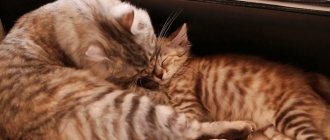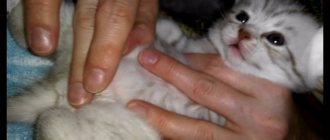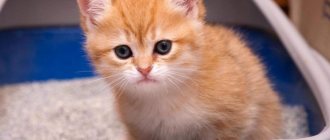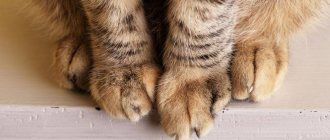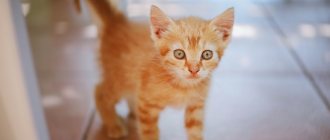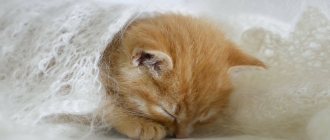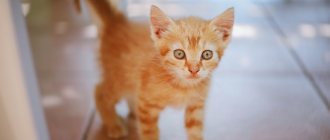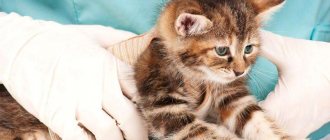Small kittens, like small children, have their own bowel habits during the early stages of life. If you decide to get yourself a one-month-old kitten, or your ward cat has brought you a litter of cute little lumps, then you should know how to properly care for them. While everything is more or less clear regarding the nutrition of kittens in the first months of their life, questions may arise with the process of evacuation. One of the most common ones is: “How often should a kitten poop?” The health of your pet depends on the answer to this question, so you need to be especially competent in it.
Do newborn kittens defecate?
Some people will find this question strange. Can kittens not poop? But where then do the products of their vital activity go?
In fact, kittens have been peeing and pooping since birth, but owners may not even notice it because the mother cat comes to the rescue. She simply licks the feces from her babies. During the bathing process, the cat involuntarily massages their tummies, which improves blood circulation and digestion.
The stool of animals during the first month of their life is homogeneous, similar to condensed milk. Therefore, it can be quite difficult for owners to determine how often kittens poop during this period. But this does not mean that they do not defecate at all.
How to encourage a kitten to poop
- Position your kitten for stimulation : After feeding, hold him firmly and gently with his back to you and place your non-dominant hand under his belly. Make sure the kitten is stimulated in a warm environment; otherwise he may get sick and even die.
- Spreading a warm, damp washcloth over your dominant hand : You will need this washcloth to stimulate your kitten's anal area and belly to get the kitten to poop. A warm, damp cloth can replace mom's tongue.
- Moving the washcloth over the kitten's butt : Using your fingers, gently massage the kitten's anal area with the wet wipe. Your thumb needs to replace the mother's tongue for the kitten to poop.
- Check : Continue massaging until the kitten finally poops, usually no longer than about 60 seconds.
- Adjusting the Washcloth : Continue rubbing and adjusting the damp cloth as needed to ensure the feces are properly removed from the kitten. Discard unclean materials and continue massaging.
© shutterstock
What to do if a kitten grows up without a mother cat?
It doesn’t always turn out that a small pet grows up next to its mother. In this case, you should become the baby's mother.
It is you who will have to feed the animal and help it with bowel movements. It should be remembered that food for a kitten up to a month should only be liquid or semi-liquid. This has a significant impact on the process of emptying it. If you do not know what to feed a one-month-old kitten, it is better to contact a veterinary pharmacy. There they will help you choose the optimal “baby” food for your ward.
If you don't know how often little kittens poop, pay attention to the appearance of their bellies. When it is swollen, it means that the baby has problems with bowel movements. Perhaps he simply cannot yet, due to his age, do without outside help.
A bloated stomach will cause him pain. You are required to gently massage his abdomen, avoiding strong pressure. Then you need to take a piece of gauze and soak it in warm water. Use the device to slowly massage the outlet of the rectum. These manipulations should help the kitten begin to relieve itself. Perhaps in the future he will no longer need your help.
How to determine that a kitten wants to go to the toilet?
Many inexperienced owners are afraid that they will not be able to determine when the kitten wants to poop. If a cat scratches the surface with its paws, the owner should transfer it to the tray as soon as possible. Usually the kitten understands from the first time what is required of him.
Another way to determine that a cat wants to go to the litter box is this behavior when he seems to sniff around, as if looking for a place. It is also worth looking at the pet’s eyes; if the owner sees that the cat seems to be glazed over, then he is definitely thinking about his goal. As soon as the cat begins to show such signs, it means that she wants to poop.
Accustoming to adult food and litter box
How often kittens poop at 1 month is easier to determine, since now this process becomes more pronounced. This happens because at approximately this age, that is, at 3-4 weeks, pets begin to be switched to more solid food. Consequently, the process of defecation also becomes more complex and organized.
At the same time, it is necessary to accustom the baby to the tray. This is how you need to act right from the first emptying, otherwise it will be more difficult to do this in the future.
Monitor your pet's behavior carefully. Usually, before the process of defecation, the behavior of animals acquires certain features. Their so-called “search activity” is activated. They can rush around the room, look for a suitable place to relieve themselves, sniff the space around them and, finally, scratch their paws on the floor.
This is how most kittens behave. However, there are also “quiet people” who silently do their business somewhere in the far corner under the bed. So be careful.
Frequency of bowel movements
Despite a more organized defecation process, determining how often a one-month-old kitten should poop is still difficult, but not impossible. On average, this happens three to six times a day.
The difficulty of determining is that the stool in animals at this age is mushy. It can easily be confused with urination, especially if you are training your pet to use a litter tray.
In general, how often kittens poop at this age is not important. The main thing is that the structure of the feces does not contain undigested food residues, mucus, blood and other impurities that may indicate a malfunction of the digestive system.
If your kitten is active, playful, cheerful, and his belly is soft and not bloated, then you have nothing to worry about. So you are doing everything right!
Factors affecting intestinal motility
There are several aspects that are an integral part of every cat's life that greatly influence how often they will defecate each day. Each of them must be taken into account, because neglecting or underestimating even one of them can lead to excessive alarmism or, even worse, to incorrect assessments on our part.
The first factor to keep in mind is obviously your pet's age: a kitten will typically defecate more times a day than an adult cat . This is due not only to the fact that their digestive system is not yet fully developed, but also because it is precisely because of their tender age that they are fed more often during the day, even if in significantly smaller quantities.
And the second factor is nutrition : it is logical to assume that the larger the meals, the more frequent and consistent the relative bowel movements will be. And if the amount of food eaten is important, we should not forget that the quality of food we feed our kitten also plays an important role in how often he will defecate. Kittens that eat a poor quality diet will actually poop more often, as more substances that the body cannot use or even metabolize are excreted directly in the feces.
Without a doubt, a proper diet goes hand in hand with keeping your kitten adequately hydrated. Make sure the kitten gets the required amount of water every day, as kittens become dehydrated very easily; this is one of the reasons we recommend a wet food diet for them.
Also beware of changes in diet, as they often cause diarrhea. They should be prepared gradually, combining small amounts of the new food with the usual and gradually changing the percentage over several days. Some food allergies can also cause diarrhea, or at least increased bowel movements.
Although kittens are generally healthier than adult cats, they are also more fragile; then there are certain conditions that may be affected that affect intestinal motility. Among them, we must certainly remember about infection by parasites (Giardia, Coccidia, Trichomonas): in fact, they tend to choose the inner lining of the intestinal walls to multiply and cause even serious damage to the body; such damage is obvious to our eyes, mainly in changes in the frequency of daily bowel movements and stool consistency.
Less of a determining factor in cats early in life, but still worth knowing is the level of physical activity they do: exercise actually promotes intestinal motility. Conversely, a kitten that is too fat or doesn't exercise much is prone to constipation.
Finally, there are some environmental factors that shouldn't be overlooked: stress caused by injury, moving, sudden changes, or an unhealthy home environment will likely cause changes in your kitten's daily habits, including the frequency with which he poops.
The condition of the litter box, which is a very important accessory for both him and you, can cause stress for the animal: if you do not regularly and thoroughly clean the litter box, a small kitten may try to keep his bowel movements in order. Avoid contact with areas that are too dirty!
Or you can just do without it, leaving you with “souvenirs” around the house. This can also happen due to so-called social stress, which usually occurs when the cat is surprised by a sudden noise or the appearance of someone while he is using the litter box, which then ceases to be a "safe place" in the house to satisfy his needs: try leaving him alone at such delicate moments!
© shutterstock
Difficulty defecating in kittens
The transition to adult food and the need to defecate independently, and even in a designated place for this, can lead to a number of difficulties. By how often a one-month-old kitten poops, you can determine whether he has difficulty defecating.
A prolonged absence of stool (more than two days) or problematic bowel movements indicates that the kitten is constipated. The reasons are poor nutrition or a small amount of water consumed by the animal. However, things can be much more serious. Constipation may indicate a disease, and not only of the gastrointestinal tract.
You can help your little pet by adding a little vegetable oil to his food. The presence of vegetables, cereals and fermented milk products in the diet will also have a laxative effect.
If these methods do not help, then use medicinal laxatives such as Duphalac, Festal, Espumisan or Vaseline oil.
In the case when these methods do not help, you have to use the most radical one: give your pet an enema. At home, you can only administer a specially designed microenema. Only a veterinarian gives a deep cleansing enema, since you yourself can harm the kitten.
Diarrhea in kittens
Another, no less unpleasant defecation disorder in kittens is diarrhea.
Before diagnosing your pet, you need to figure out how often kittens poop and whether it’s diarrhea at all. Many owners believe that if a kitten’s stool becomes liquid, then this is diarrhea. However, it is not.
Diarrhea is not only watery stool consistency, but also a frequent urge to defecate. An additional symptom may also be bloating.
The causes of diarrhea in an animal can be helminthic infestations, poor nutrition, infectious and inflammatory diseases. On a psychological level, early separation of a kitten from its mother can provoke diarrhea.
If a kitten has diarrhea, it is advisable not to feed it for about 12 hours, but to give it only water. By the way, he must drink. Not drinking water can lead to dehydration.
In this case, a sorbent such as Smecta or Enterosgel can be used as a medication.
If attacks of diarrhea no longer recur, then after 12 hours the pet can be fed. First, a little boiled rice or three-day (!) kefir is given. Fresh fermented milk products can only worsen the situation. The next day, boiled chicken meat, and so on, expanding the diet.
In any case, self-medication is not recommended for either people or animals. Therefore, if there are various disturbances in the process of relieving yourself in your little family member, you need to show him to the veterinarian.
Host mistakes
You can find out how often a kitten poops at 2 months by how many times it visits the litter box. But the animal does not always choose a pot to satisfy its natural needs. This may be the owner's fault. Here is a list of possible reasons:
- Late trained to use the tray. The most optimal age for this is one month. Later it will be more difficult.
- Dirty pot. If you don't clean the litter box in time and change the filler, the kitten may go somewhere else. Remember that cats are clean animals!
- Wrong place. If the litter box is in a place that scares and the kitten doesn't like, he won't go in it.
- Another tray. If you decide to change your pet's litter tray, be prepared for the fact that he may refuse to relieve himself in the new one. In this regard, cats are monogamous.
- Foreign odors. The cat may not like the smell from the potty, and therefore he will refuse to go into it. Therefore, you need to exclude all flavors and wash the tray with plain water. It is also forbidden for several animals to go into one tray.
- Don't punish. This method will not help you accustom your pet to the tray, but will only instill fear of the owner.
- Doesn't shit where he eats. If your pet has chosen another place as a toilet, make his dining room there, after washing everything with odor eliminating products.
- Health problems. If you follow all the rules, but the kitten still shits in the wrong place, you should contact a veterinarian.
Why do problems with stool occur?
If an older kitten with well-opened eyes eats and drinks well, but cannot walk around every day, then there are the following reasons for this:
- Stress. Very often, a kitten suffers from constipation due to stress. Early weaning from a cat has a particularly difficult effect. The kitten, missing its mother cat, sometimes experiences difficulty passing stool for 5 days. If kids in a new home cannot go to the toilet on their own during this time, then there is nothing wrong with that. If the situation does not resolve after 5 days, then you need to visit a veterinarian. You need to try to make the cat calm down; as soon as he gets used to his new place of residence, the situation should resolve itself.
- A kitten may have difficulty passing stool if it has an improperly balanced diet. When a cat finds itself in a new home, you should try to initially stick to the same menu as the old owners. It is best to use specially formulated food for babies. When a cat eats natural food, it is better to include plant foods, boiled meat, and cereals. After the new owners select suitable food for the babies, they themselves begin to go to the toilet. How many times a cat goes to the litter box depends on what it eats. He can go up to 4 times a day if he eats food rich in fiber; when eating meat, cats visit the litter box about 2 times a day.
- Another common cause is constipation. When a kitten cannot poop for about a week, it may have a health problem, which led to the development of a similar situation. In this case, the pet must be shown to a veterinarian; only he can correctly assess the situation and prescribe treatment.
Preventing constipation and diarrhea
You've already learned how often kittens poop and how to care for them. A loving owner should also take care of preventing problems with bowel movements. To do this you need:
- comb the animal regularly so that excess hair does not clog the intestines when licking;
- give kittens phytomines to cleanse the intestines;
- feed your pet a variety of foods, using foods rich in fiber;
- give space for your pet’s active life, which improves intestinal motility;
- contact your veterinarian in time.
The kitten rarely goes to the toilet
From time to time, babies have problems with constipation, and they may not be able to cope with bowel movements on their own. If the animal does not poop for 2 days, you should be wary.
Often the reason lies in improper feeding. It is necessary to follow the recommendations of the breeder or veterinarian, introduce new food gradually, and do not forget to drink plenty of fluids.
Stress from moving can cause constipation in a small pet; increased attention from the owner will help here. The little ones will need a gentle circular (clockwise) tummy massage.
